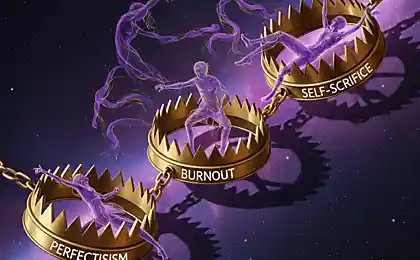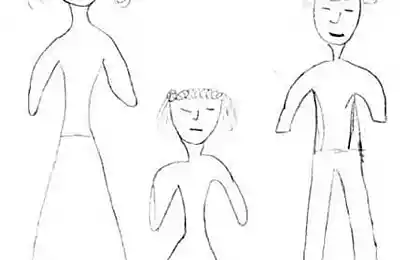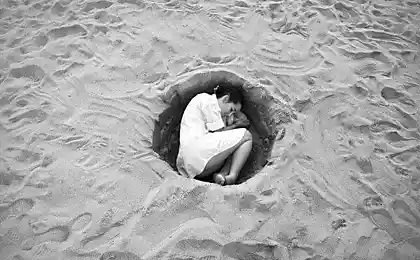439
Emotional burnout is a symptom of our time

Burn-out is a symptom of our time. It is a state of exhaustion that leads to paralysis of our strengths, feelings and is accompanied by a loss of joy in relation to life. In our time, cases of burnout syndrome are increasing. This applies not only to social professions, for which burnout syndrome was characteristic earlier, but also to other professions, as well as personal life. The spread of burnout syndrome contributes to our era – a time of achievement, consumption, new materialism, entertainment and enjoyment of life. It is a time when we exploit ourselves and allow ourselves to be exploited. That's what I want to talk about today.
I will first describe burnout syndrome and say a few words about how it can be recognized. Then I will try to talk about the background against which this syndrome occurs, and then give a brief overview of the work with burnout syndrome and show how it can be prevented.
Easily Extinguished
Who doesn’t know the symptoms of burnout? I think everyone has ever felt them. We find signs of exhaustion if we have experienced a lot of stress, accomplished something large-scale. For example, if we were preparing for exams, working on a project, writing a dissertation or raising two young children. Sometimes it took a lot of effort at work, there were some crisis situations, or, for example, during the flu epidemic, doctors had to work very hard.
And then there are symptoms such as irritability, lack of desire, sleep disorder (when a person cannot fall asleep, or, conversely, sleeps for a very long time), decreased motivation, a person feels predominantly uncomfortable, depressive symptoms may manifest. This is a simple version of burnout - burnout at the reaction level, physiological and psychological reaction to excessive stress. When the situation is over, the symptoms disappear on their own. In this case, free weekends, time for yourself, sleep, vacation, sports can help. If we do not replenish energy through rest, the body goes into a saving mode. In fact, both the body and the psyche are designed so that great tension is possible, because people sometimes have to work hard, achieve some big goals. For example, to get your family out of trouble. The problem lies in another: if the challenge does not end, that is, if people really cannot rest, are constantly in a state of tension, if they constantly feel that some demands are being made on them, they are always concerned about something, they are afraid, they are constantly vigilant about something, something they expect, this leads to an overstrain of the nervous system, a person has muscles tense, pain. Some people in a dream begin to grind their teeth - this can be one of the symptoms of overstrain.
Chronic burnout
If the tension becomes chronic, then burnout reaches the level of the disorder.
In 1974, a New York psychiatrist named Freudenberger first published an article about volunteers who worked in the social field on behalf of the local church. In this article he described their situation. These people had symptoms similar to depression. In their history, he always found the same thing: at first, these people were absolutely delighted with their activities. Then this excitement gradually began to decrease. And eventually they burned to the point of a handful of ashes. All of them had similar symptoms: emotional exhaustion, constant fatigue. The thought of going to work tomorrow made them feel tired. They had various bodily complaints, they were often ill. It was one of a group of symptoms.
As for their feelings, they no longer had power. What happened was what he called dehumanization. Their attitude towards the people they helped changed: first it was a loving, attentive attitude, then it turned into cynical, rejecting, negative. Relations with colleagues also deteriorated, there was a sense of guilt, a desire to get away from it all. They worked less and did everything like robots. These people were not able to enter into a relationship as before and did not seek it.
This behavior has a certain logic. If I no longer have the strength in my feelings, then I do not have the strength to love, to listen, and other people become a burden for me. It feels like I can no longer meet them, their demands are excessive for me. Automatic protective reactions begin to operate. From a mental point of view, this is very reasonable.
As the third group of symptoms, the author of the article found a decrease in productivity. People were dissatisfied with their work and their achievements. They felt powerless and did not feel that they were achieving any success. There was too much for them. And they felt they were not getting the recognition they deserved.
In this study, Freudenberger found that burnout symptoms did not correlate with working hours. Yes, the more someone works, the more their emotional strength suffers. Emotional exhaustion increases in proportion to the number of working hours, but the other two groups of symptoms - productivity and dehumanization, dehumanization of relationships - are almost unaffected. People continue to be productive for a while. This indicates that burnout has its own dynamics. It's more than just exhaustion. We'll stop there.
PERSONAL STATES
Freudenberger created a scale consisting of 12 burnout stages. The first stage still looks very harmless: at first, patients with burnout have an obsessive desire to assert themselves ("I can do something"), perhaps even in competition with others.
Then begins a careless attitude to their own needs. A person no longer devotes free time to himself, does less sports, he has less time for people, for himself, he talks less with someone.
In the next stage, a person does not have time to resolve conflicts, and therefore he displaces them, and later even ceases to perceive them. He does not see that there are any problems at work, at home, with friends. He's retreating. We see something like a flower that is fading more and more.
In the future, feelings about yourself are lost. People don't feel like themselves anymore. They are just machines, machines and can no longer stop. After a while, they feel an inner emptiness and, if this continues, they are more likely to become depressed. In the twelfth stage, the person is completely broken. He gets sick – physically and mentally, experiences despair, suicidal thoughts are often present.
One day a patient came to me with an emotional burnout. He came, sat in a chair, exhaled and said, “I’m glad I’m here.” He looked exhausted. It turned out he couldn't even call me to arrange a meeting - his wife dialed the phone number. I asked him on the phone how urgent it was. He said it was urgent. And then I made arrangements with him for the first meeting on Monday. On the day of the meeting, he admitted: 'All two days of the weekend I couldn't guarantee I wouldn't jump out the window. My condition was so intolerable.”
He was a very successful businessman. His staff knew nothing about it - he managed to hide his fortune from them. For a long time he kept it from his wife. At the eleventh stage, his wife noticed it. He continued to deny his problem. And only when he could no longer live, already under pressure from the outside, was he ready to do something. This is how far burnout syndrome can lead. Of course, this is an extreme example.
From Enthusiasm to Disgust
To describe in simpler terms how burnout manifests itself, we can resort to the description of the German psychologist Mathias Burisch. He described four stages.
The first stage looks completely harmless: it’s really not quite burnout yet. This is the stage where you need to be careful. It is then that a person is driven by idealism, some ideas, some enthusiasm. But the demands he constantly makes on himself are excessive. He demands too much of himself for weeks and months.
The second stage is exhaustion: physical, emotional, bodily weakness.
In the third stage, the first protective reactions usually begin to act. What does a person do when the demands are constantly excessive? He leaves the relationship, there is dehumanization. It is a reaction of resistance as a defense so that exhaustion does not get worse. Intuitively, the person feels that he needs peace, and to a lesser extent maintains social relationships. Those relationships that must be lived, because without them it is impossible to do, burdened by rejection, repulsion.
In principle, this is the right reaction. But only the area where this reaction takes effect is not appropriate. Rather, a person needs to be calmer about the requirements that are presented to him. But that’s exactly what they can’t do: avoid requests and claims.
The fourth stage is the strengthening of what happens in the third stage, the terminal stage of burnout. Burish is called “disgust syndrome.” This is a concept that means that a person no longer carries any joy in himself. There is disgust for everything. For example, if I eat rotten fish, I vomit, and the next day I smell fish, I get disgust. That is, it is a protective feeling after poisoning.
Causes of fire
Speaking of causes, in general, three areas are distinguished. This is an individual psychological area when a person has a strong desire to give in to this stress. The second area, socio-psychological or social, is external pressure: various fashion trends, some social norms, requirements at work, the spirit of the times. For example, it is believed that every year you have to go on a trip – and if I can’t, then I don’t fit the people living in a given time, their way of life. This pressure can be carried out in a latent form, and it can result in burnout.
More dramatic requirements are, for example, extended working hours. Today, a person overworks and does not receive payment for it, and if he does not, he is fired. Perpetual overwork is a cost inherent in the capitalist era, within which Austria, Germany and probably also Russia live.
So we identified two groups of causes. In the first case, we can work in the psychological aspect, in the framework of consulting, and in the second case, we need to change something at the political level, at the level of trade unions.
But there is a third reason, which has to do with the organization of systems. If the system gives the individual too little freedom, too little responsibility, if mobing occurs, then people are exposed to a lot of stress. And then, of course, a restructuring of the system is needed. It is necessary to develop the organization in a different way, to introduce coaching.
The point is not to buy
We shall confine ourselves to a group of psychological causes. In existential analysis, we have empirically established that the cause of emotional burnout is an existential vacuum. Emotional burnout can be understood as a special form of existential vacuum. Viktor Frankl described the existential vacuum as suffering from a sense of emptiness and meaninglessness.
A study conducted in Austria, during which 271 doctors were tested, showed the following results. They found that physicians who lived meaningful lives without the existential vacuum experienced almost no burnout, even if they worked for hours. The same doctors who showed relatively high levels of existential vacuum in their work showed high burnout rates, even if they worked fewer hours.
From this we can conclude: meaning cannot be bought. Making money does nothing if I suffer from emptiness and meaninglessness in my job. We can't make up for that.
Burnout syndrome raises the question: Do I really make sense of what I do? Meaning depends on whether we feel personal value in what we do or not. If we follow a seeming meaning: career, social recognition, love, then it is a false or seeming meaning. It costs us a lot of energy and causes stress. And as a result, we have a deficit of execution. Then we experience devastation, even when we relax.
At the other extreme is a way of life where we experience fulfillment, even when we are tired. Execution, despite fatigue, does not lead to burnout.
Generally speaking, we can say that burnout is the final state resulting from the continued creation of something without experiencing the aspect of fulfillment. That is, if I experience meaning in what I do, if I feel that what I do is good, interesting and important, if I enjoy it and want to do it, then burnout does not occur. But these feelings should not be confused with excitement. Enthusiasm does not necessarily have to do with fulfillment – it is a more hidden, more modest thing.
What am I giving myself to?
Another aspect that burnout brings us to is motivation. Why am I doing something? And how much do I address that? If I can't give my heart to what I'm doing, if I'm not interested in it, I'm doing it for some other reason, then we're lying in some sense.
It’s like listening to someone but thinking about something else. I mean, then I'm not here. But if I'm not present at work, in my life, then I can't get paid for it. It's not about money. Yes, I can make money, but I don’t personally get paid. If I am not present with my heart in something, but use what I do as a means to an end, then I am abusing the situation.
For example, I can start a project because it promises me a lot of money. And I can hardly refuse and somehow resist it. In this way, we can be tempted by some choice that will lead us to burnout. If it only happens once, it may not be so bad. But if it goes on for years, then I'm just passing my life by. What am I giving myself to?
And here, by the way, it can be extremely important that I have burnout syndrome. Because I probably can't stop myself from moving. I need that wall that I'm going to face, some kind of push from the inside so that I just can't keep moving and reconsider my actions.
The example of money is probably the most superficial. The motives may be much deeper. For example, I might want a confession. I need praise from someone else. If these narcissistic needs are not met, I become restless. From the outside, it is not visible at all – only people who are close to this person can feel it. But I probably won't even talk to them about it. I don’t realize that I have these needs.
For example, I need confidence. I learned poverty as a child, I had to wear old clothes. They made fun of me and I was ashamed. Maybe even my family was starving. I would never want to go through that again.
I know people who have become very rich. Many of them have reached burnout syndrome. Because for them, that was their primary motivation — to prevent poverty anyway, so they wouldn't be poor again. It's humanly understandable. But it can lead to excessive demands that will never end.
In order for people to be ready to follow such apparent, false motivation for a long time, there must be a lack of something behind their behavior, a mentally perceived deficit, some kind of trouble. This deficiency leads to self-exploitation.
Value of life
This deficiency can not only be a subjective need, but also an attitude towards life, which, ultimately, can lead to burnout.
How do I understand my life? On this basis, I can develop my goals according to which I live. These attitudes can be from the parents, or the person develops them in himself. For example: I want to achieve something. Or: I want to have three children. Become a psychologist, doctor or politician. Thus, a person sets goals for himself that he wants to follow.
It's perfectly normal. Who among us has no purpose in life? But if goals become the content of life, if they become too much value, then they lead to rigid, frozen behavior. Then we put all our strength to achieve the goal. Everything we do becomes a means to an end. And this does not have its own value, but only a useful value.
“It’s good that I play the violin!” is a living of self-worth. But if I want to be the first violin in a concert, then when I play a piece of music, I’m constantly comparing myself to others. I know I still have to practice, play and play to get there. That is, my goal orientation is predominant due to the value orientation. Thus, there is a deficit of internal relations. I do something, but there is no inner life in what I do. And then my life loses its value. I destroy the inner contents in order to achieve my goals.
And when a person in this way neglects the intrinsic value of things, does not pay enough attention to this, there is an underestimation of the value of his own life. That is, I use the time of my life for the purpose I set for myself. This leads to loss of relationships and inconsistency with oneself. And with such an inattentive attitude to inner values and the value of one’s own life, stress arises.
Everything we have just talked about can be summarized as follows. The stress that leads to burnout is due to the fact that for too long, without a sense of inner consent, we do something without a sense of value of things and ourselves. Thus, we come to a state of predepression.
It also happens when we do too much, just to do it. For example, I cook lunch just so it's ready. And then I'm glad it's behind me, done. But if we are happy that something has already passed, it is an indicator that we have not seen value in what we do. And if it doesn't have value, then I can't say that I like doing it, that it's important to me.
If we have too many of these elements in our lives, then we are essentially happy that life is passing by. So we like death, destruction. If I'm just doing something, it's not life, it's functioning. And we shouldn’t, we don’t have the right to function too much – we should make sure that in everything we do, we live, feel life. So she won't pass us by.
Burnout is such a psychic account that we are charged for a long alienated relationship with life. This is a life that is not really mine.
He who is more than half the time occupied with things he does reluctantly, does not give it his heart, does not feel joy, he sooner or later should expect to survive burnout syndrome. Then I'm in danger. Wherever in my heart I feel an inner agreement about what I do and feel myself, there I am protected from burnout.
Fire prevention
How to deal with burnout syndrome and how to prevent it? Much is solved by itself, if a person understands what is associated with burnout syndrome. If you understand this about yourself or your friends, you can begin to solve this problem, talk to yourself or friends about it. Should I continue to live this way?
I felt that way myself two years ago. I wanted to write a book over the summer. With all the papers, I went to my dacha. I came, looked around, went for a walk, talked to the neighbors. The next day I did the same thing: I called friends, we met. On the third day again. I thought I should actually start by now. But I didn’t feel much desire in myself. I tried to remind you that it is necessary, what is waiting for the publishing house - it was already pressure.
Then I remembered burnout syndrome. And I said to myself, I probably need more time, and my wish will come back. And I allowed myself to watch. Because the desire came every year. But it didn't come that year, and until the end of the summer, I didn't even open that folder. I didn't write a line. Instead, I rested and did wonderful things. Then I began to hesitate, how do I treat it as bad or as good? So I couldn't, it was a failure. Then I told myself that it was reasonable and good that I did so. The thing is, I was a little exhausted because there was so much to do before the summer, the whole academic year was very busy.
Here, of course, I had an internal struggle. I really thought and thought about what was important in my life. As a result, I doubted that writing a book was such an important thing in my life. It is much more important to live something, to be here, to live a valuable relationship – if possible, to experience joy and not to postpone it all the time. We don't know how much time we have left.
In general, work with burnout syndrome begins with unloading. You can reduce time, delegate, share responsibilities, set realistic goals, and critically consider your expectations. It's a big topic to discuss. Here we really come across very deep structures of existence. Here we are talking about our position in relation to life, about the fact that our attitudes are authentic and correspond to us.
If burnout syndrome has a much more pronounced form, you need to get sick, physically rest, consult a doctor, with milder disorders, treatment in a sanatorium is useful. Or just make a good time for yourself, live in a state of unloading.
But the problem is that many people who have burnout syndrome cannot afford it. Or a person goes to hospital, but continues to make excessive demands on himself – thus he can not get out of stress. People suffer from remorse. And in a state of illness, burnout increases.
Medications may help in the short term, but they are not a solution. Bodily health is the foundation. But you also need to work on your own needs, on the inner scarcity of something, on attitudes and expectations in relation to life. We need to think about how to reduce the pressure of society, how to protect yourself. Sometimes even think about changing jobs. In the worst case I have seen in my practice, it took a person 4-5 months off from work. And when you go to work, you have a new way of working, otherwise, in a couple of months, people burn out again. Of course, if a person has been working on wear and tear for 30 years, it is difficult for him to reconfigure, but it is necessary.
You can prevent burnout syndrome by asking yourself two simple questions:
1) What am I doing this for? Why am I in college, why am I writing a book? What's the point? Is that valuable to me?
2) Do I like doing what I do? Do I like to do that? Do I feel like it's good? So good that I do it willingly? Does what I do bring me joy? This may not always be the case, but feelings of joy and satisfaction must prevail.
In the end, I might ask another larger question: Do I want to live for it? If I lay on my deathbed and look back, do I want to live for it?
Source: www.all-yoga.ru/blogs/archives/597
72 hours that are very important not to miss at the time of death of loved ones
The most amazing facts about dolphins























